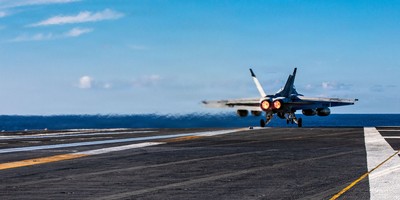Osama bin Laden is dead. The Middle East is in chaos. And radical Islam is floundering.
For a time after 9/11, bin Laden was riding high. Destroying 16 acres in Manhattan and hitting the Pentagon won al-Qaeda even more admiration from the Arab Street, hidden cash donations from sympathetic petrol-sheiks, and bribe and hush money from triangulating Middle East dictatorships.
But now bin Laden and most of his henchmen of a decade ago are dead, like the bloodthirsty Abu Musab al-Zarqawi, killed by American forces in Iraq. Or they were captured, like the 9/11 architect Khalid Sheikh Mohammed in Pakistan. Or they are in hiding, like Dr. Ayman al-Zawahiri, the increasingly irrelevant blowhard al-Qaeda information minister.
What caused al-Qaeda's steady decline? There are a lot of reasons.
Right after 9/11, the United States crafted a set of antiterrorism protocols as sweeping as they were controversial: the Patriot Act, Guantanamo Bay, renditions, tribunals, preventative detention, intercepts, wiretaps and enhanced interrogations. New security measures filtered down to every facet of American life, from radically intrusive and unpopular airport protocols that X-rayed baggage and passengers to beefed-up security on trains and at ports.
Civil libertarians mocked such vigilance, but the message went out that it was now much harder to come to America from the Middle East and in anonymity plan another 9/11. Subsequent terrorist attempts, aimed at targets such as the Brooklyn Bridge and Times Square, either failed or were thwarted before they began.
Recommended
In wars abroad, thousands of radical Islamic jihadists heeded bin Laden's call to arms and flocked to the Hindu Kush and Anbar Province. The United States military and its allies were waiting, and then killed or wounded many thousands of terrorists and insurgents. That indisputable fact is as little remarked upon as it was critical to weakening and discrediting the martial prowess of radical Islam.
We also forget that the removal of Saddam Hussein, followed by his trial and execution by a democratically elected Iraq government, set off initial ripples of change in the Middle East between 2004 and 2006. The Syrian army was pushed out of Lebanon by popular protests. Muammar Gadhafi surrendered his nuclear weapons and publicly worried about his own future. Pakistan abruptly arrested for a time A.Q. Khan, who had franchised his nuclear weapons expertise.
These events did not lead directly to the current popular protests throughout the Middle East, but they may well have been precursors of a sort, once Iraq's elected government survived and the violence there abated.
But there is a final development that caused headaches for radical Islam -- the end of the American hysteria over the legality and morality of its own antiterrorism measures.
Although candidate Barack Obama was elected as the anti-Bush who promised to repeal the Bush protocols and end the wars in Afghanistan and Iraq, President Obama did no such thing. He continued the Bush-Petraeus withdrawal plan in Iraq. He escalated in Afghanistan. He kept all the antiterrorism measures that he had once derided. And he expanded the Predator drone assassination missions fivefold, while sending commandos inside Pakistan to kill -- not capture and put on trial -- bin Laden. He ignored most recommendations from Attorney General Eric Holder and guessed rightly that his own left-wing base would keep largely quiet.
The effect was twofold. America kept up the pressure on terrorists and their supporters. And the liberal opposition to our antiterrorist policies simply evaporated once Obama became commander in chief.
Some who once protested the removal of Saddam lauded the efforts to do the same to Gadhafi. Those who once sued on behalf of detainees at Guantanamo joined the government to ensure the Predator drone targeted-killing program continued.
The chances in 2012 that the buffoonish Michael Moore -- who once praised the Iraqi insurgents -- will be again feted as a guest of honor at the Democratic National Convention, as he was in 2004, or that Cindy Sheehan will grab headlines once again, are zero.
Polls show that Obama's America is still just as unpopular among Middle Easterners as it was under George W. Bush. But now a much different media assumes that the problem is theirs, not America's. In this brave new world, the American liberal community is now invested in the continuance of the once-despised Bush antiterrorism program and the projection of force abroad -- and has little sympathy for foreign criticism of an American president.
Quite simply, bin Laden's world of 2001 no longer exists. That's mostly good for us, but quite bad for the dead terrorist's followers.

























Join the conversation as a VIP Member